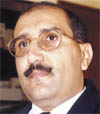Nasserite MPs: Force for Change in Yemeni Parliament [Archives:1998/10/Interview]
Mr. Abdullah Mohammed Saleh Al-Maqtari MP is the head or the Nasserite bloc in parliament. In addition to his scientific training, having a B.Sc. in statistics and computer sciences, Al-Maqtari, 43, is the Assistant Secretary-General of the Central Committee of the People’s Nasserite Unionist Organization.
Along with Islah, the Socialist Party, the Baath Party, the Nasserite bloc in parliament represents the official opposition to the ruling party with the parliamentary majority, the People’s General Congress.
Ismail Al-Ghabiri of Yemen Times met Mr. Al-Maqtari and filed the following the interview.
Q: Does the Nasserite bloc in parliament have a distinguished agenda?
A: Of course we have a distinct agenda. It is adapted from the Nasserite program of the last parliamentary elections. The program specifies the important issues and priorities. The distinction in our agenda appears in the type of issues and cases we champion in parliament.
Q: How do you evaluate your efficiency as an opposition bloc in parliament?
A: It not for us to evaluate our own performance. We leave that to other more neutral observers. Through the opinions of others, friends or otherwise, we can then formulate a reasonably objective evaluation of our bloc’s performance in parliament. Also, there must be certain objective criteria and scientific standards to follow.
I believe that the main scientific criterion in evaluating parliamentary work is decided by the stances taken towards certain important issues. By principle, we support the cause and interests of our people and the Arab and Islamic nation. We adopt, as our own, the people’s concerns and sufferings and try to tackle them through constructive dialogue with our colleagues in parliament. Through logical and persuasive debates and discussions we get a lot of support from other MPs, partisan and independent. This makes us feel the effectiveness of our role.
However, difficulties arise when certain political issues are presented to parliament with a prior stance taken by the government towards them. Then we find somewhat difficult to convince our colleagues in the parliamentary majority of our point of view. Actually, the difficulty is not in whether our position is right or wrong, but in the majority MPs not being able to act out of the direct partisan instructions. This is often true irrespective of their own personal convictions.
The most important thing is how we are being evaluated by the people and how they follow our work through the various media. I can confidently say that our the people have responded positively to our success in parliament.
Q: How do you evaluate the performance of parliament itself during the first ten months of its life?
A: The ten-month period of this parliament’s life, since it was assembled following the general elections on April 27, 1997, is not really long enough to be able to accurately evaluate its performance. But I can say that there is a number of factors that point out to several inadequacies: the way parliament is generally run; its particular cultural, intellectual, and social combination which was made up by the interference in the election process; the rising level of public awareness of the importance of parliamentary elections; lack of political balance within parliament; the distribution of its specialized committees; and other factors.
All these imbalances are not helping parliament to raise the level of its performance to be on par with its many constitutional duties as a legislative authority. The actual democratization process is still inadequate and below the expectations for democratic legislations in Yemen.
In spite of everything, we consider this as a stage in the democratic development of our country.
Q: What is the main point of your opposition in parliament?
A: Actually, there are several topics of contention and strong opposition: the government program submitted on May 28, 1997, for a vote of confidence and ratified on June 6; the government’s decision to raise the prices of wheat, flour and fuel; and the state’s general budget of 1998. Our opposition is based on a number of basic and quintessential issues.
Q: What is the major bill of law or proposition you successfully presented to parliament?
A: We react enthusiastically to any positive proposal irrespective of who submits it.
Q: Parliament is plagued by absenteeism. How do you explain that?
A: Absenteeism can be attributed to a number of causes:
– Many MPs are actually disappointed and frustrated with the assembly’s performance and lack of effectiveness. It is true that laws are debated and ratified, but they are seldom fully enacted. So some MPs feel that this parliament is no more than decor.
– There is a marked lack of monitoring the executive authority. If it happens at all, the monitoring process is seldom effectual due to the interference of some influential people.
– The efficiency of the parliament’s presidium and special committees is just not as it really should be.
– Those MPs who often absent themselves from the parliamentary sessions are putting their narrow personal interests above the overall interest of the nation.
So when the government wants to pass any sort of law or case, it can just order its MPs to vote as desired, and that is that.
Q: Are you a member of a particular parliamentary committee?
A: The way these parliamentary committees were formed was not according to specialty, competence, or experience. It was a sort of a political sharing between Islah and the People’s General Congress, without regard to objective criteria.
For example, I am a member of the Information, Culture and Tourism Committee. I was appointed in this committee without any regard to my training in computer sciences and my 13-year experience in planning and development. Although I indicated all that in my CV and stated my desire to join the Development Committee, I found myself in the wrong committee!
Q: How do view the parliament’s relations with the other complementary bodies such as the consultative council?
A: Parliament’s relations with other organizations is determined by the Constitution. However, the relation with the Consultative Council, for instance, is still somewhat unclear. There is no law that specifies the Consultative Council’s powers and sphere of activity as a legal body to refer back to. The Elections Law, on the other hand, regulates the parliament’s relation with the Supreme Elections Committee.
___________________
Ismail Al-Ghabiri also talked to another MP and member of the Nasserite bloc in parliament.
Mr. Ali Mohammed Al-Yazidi MP is the Secretary of the Nasserite organization in Yafi’ and a member of the Central Committee and General Assembly of the People’s Nasserite Unionist Organization. In addition to being a member of parliament, Al-Yazidi, 51, is also an employee of the Yemeni Oil and Mineral Investment Company.
Q: As an opposition MP, what is the issue that has greatly aroused your rejection?
A: We strongly opposed the government’s program. It is simply unconstitutional, quite vague, and contravenes the elections program of the majority party and the state’s five-year plan.
Our bloc also opposed the 1998 general budget submitted by the government. This was due to the budget’s of concern for investments, lack of governmental commitment to alleviate the economic crisis, and its inflated reliance on oil as a major source of revenue, neglecting other sources such as fisheries, agriculture, etc.
Q: What do you think of the MPs who often absent from the parliamentary sessions?
A: Absenteeism is a very negative phenomenon. It shows lack of responsibility on part of some MPs who made solemn constitutional vows and pledges to honestly and assiduously bear this trust. An often absent MP cannot closely follow the debates and committee reports discussed by other MPs. So he or she gradually loses influence in the assembly.
Q: In which parliamentary committee are you?
A: I am a member of the Financial Affairs Committee, which is one of the very important committees in parliament. It has the task of reviewing the state general budget, the final accounts for various governmental sectors, draft laws with financial nature, and the loan agreements made with foreign countries and organizations. It submits regular reports of its findings.
——
[archive-e:10-v:1998-y:1998-d:1998-03-09-p:./1998/iss10/intrview.htm]


